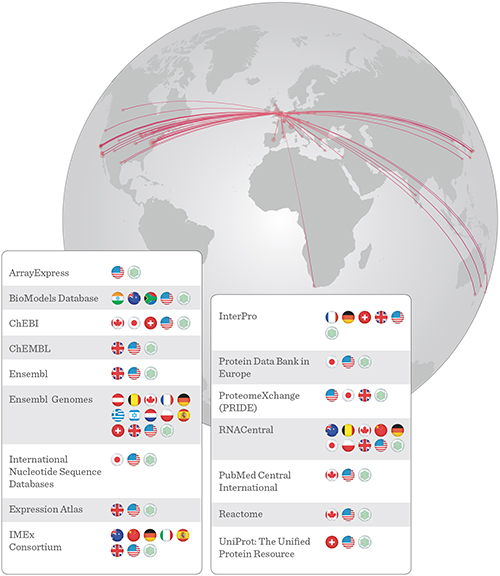We are a highly collaborative organisation, with data services run in partnership with organisations throughout the world, international research projects of global significance and joint initiatives with companies of all sizes.
We are also a partner in several of Europe’s emerging research infrastructures, and host the Hub of ELIXIR, Europe’s distributed infrastructure for life-science information.
We serve as the European node for globally coordinated data collection and dissemination projects, for example the worldwide Protein Data Bank (wwPDB) and the International Nucleotide Sequence Database Collaboration (INDSC).
Our core databases are produced together with other world leaders, including:
- NCBI (US)
- National Institute of Genetics (Japan)
- SIB Swiss Institute of Bioinformatics (Switzerland)
- Wellcome Sanger Institute (UK)
- Cold Spring Harbor Laboratory (US).
Our collaborations enable us to offer the world’s most comprehensive collection of molecular databases.

EMBL-EBI hosts the Hub of ELIXIR, the distributed European infrastructure for biological information. The purpose of ELIXIR is to support research and its translation to medicine and the environment, the bio-industries and society.
EMBL-EBI participates in several ELIXIR initatives and is a partner on CORBEL, which seeks to harmonise user access to life-science resources, and Excelerate, an initiative to fast-track the implementation of life-science data infrastructure.
Each of our research groups collaborates with partners worldwide on a range of projects, publishing in prestigious peer-reviewed journals and producing innovative, novel software databases and tools that are freely available to our users.
Some 20% of our data users are engaged in industrial R&D, and our services are constantly evolving to reflect the rapidly changing needs of the sector.
As biology becomes more data-driven, the bioindustries are increasingly forming pre-competitive collaborations, as well as open-source software and informatics standards to improve efficiency and reduce costs.
Public health research
COMPARE
We are a partner in COMPARE, an international collaboration to speed up the detection of and response to infectious disease outbreaks using genome technology.
By providing compute and data-sharing infrastructure, we make it possible for clinical, risk-assessment and research professionals to access, analyse and compare crucial information in real time.
ZIKAlliance
We are also a partner in the ZIKAlliance, a multinational endeavour that investigates clinical, fundamental, environmental and social aspects of Zika virus infection.
We help coordinate molecular data for this crucial project, which focuses on pregnant women, environmental factors and epidemiology.
The EGA is a robust archive of all types of personally identifiable genetic and phenotypic data resulting from biomedical research projects. This is a collaboration between EMBL-EBI and the Centre for Genomic Regulation in Spain.
The Global Alliance for Genomics and Health (GA4GH) is a global effort to accelerate medical and research advancements through the responsible sharing of genomic and clinical data.
With support from the Chan-Zuckerberg Initiative, we are working with the Broad Institute and the UCSC Genomics Institute to build a cloud-based data coordination platform and tools for the Human Cell Atlas (HCA), an ambitious initiative that will change the way we think about anatomy.
EMBL-EBI manages data for the International Mouse Phenotyping Consortium (IMPC), which promotes replacement, reduction and refinement in animal research.
The IMPC’s goal is to determine the functions of some 20,000 genes common to mice and humans by systematically knocking out protein-coding genes in the mouse and assessing the physiological characteristics associated with each one.
EMBL-EBI, in collaboration with MRC Harwell and the Wellcome Sanger Institute, delivers IMPC informatics.
Open Targets is transforming the way scientists find, validate and prioritise drug targets.
It blends the expertise of world-leading organisations including GSK, EMBL-EBI, Sanofi and the Wellcome Sanger Institute to identify and validate the causal links between targets, pathways and diseases. Open Targets welcomes new partners who share its vision.
The Pan-Cancer Analysis of Whole Genomes (PCAWG) project undertakes whole-genome-sequencing, transcriptome, and DNA methylome profiling from 20 cancer types in 2500 patients.
EMBL-EBI research activities include novel mutation identification methods, translation to the clinic as well as standardised integrative analyses of data generated in diverse contexts where sharing of raw patient genomic data is complicated or impossible.
Our Industry Programme helps establish collaborations in the context of the Innovative Medicines Initiative.
- eTOX: Developing innovative in silico strategies and novel software tools to better predict the toxicological profiles of small molecules in early stages of the drug development pipeline.
- eTRANSAFE: Developing a powerful data integration infrastructure for computer-based tools for use in drug development.
- EUbOPEN: Creating the largest and most deeply characterised collection of chemical modulators of protein function that is also openly accessible.
- FAIRplus: Developing tools and guidelines for making life science data FAIR (Findable, Accessible, Interoperable, Reusable).
- TransQST: Translational quantitative systems toxicology to improve the understanding of the safety of medicines